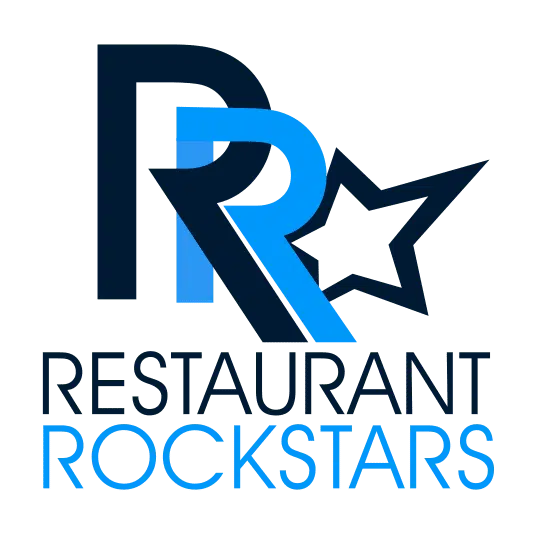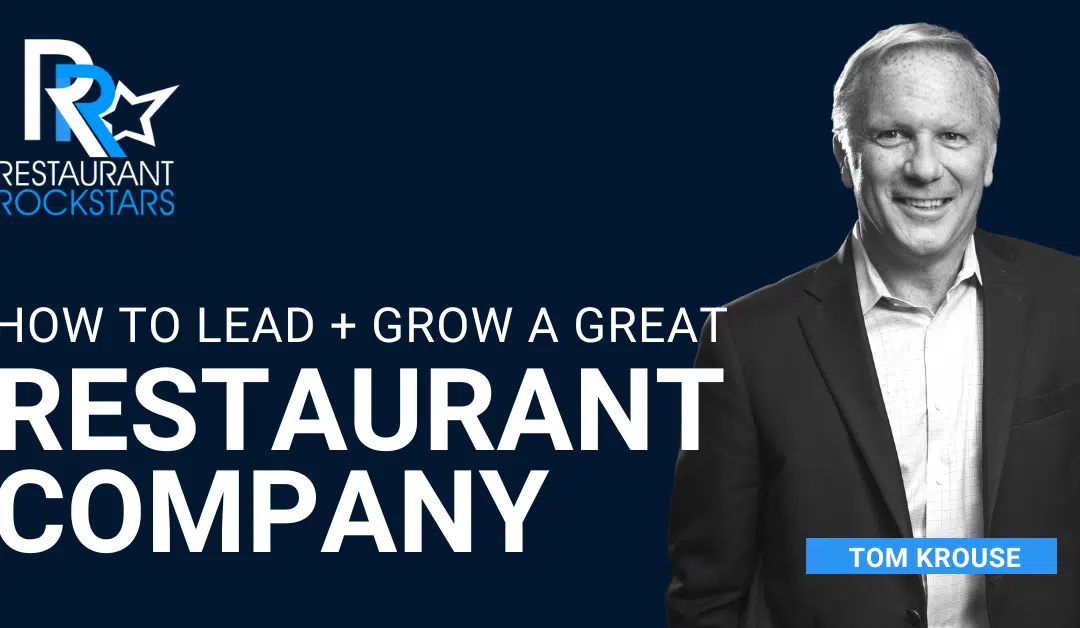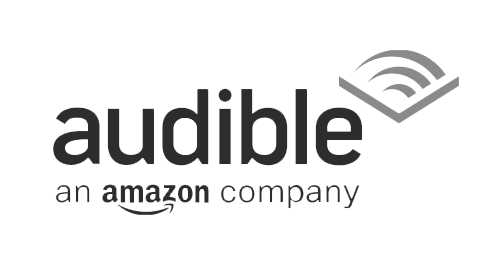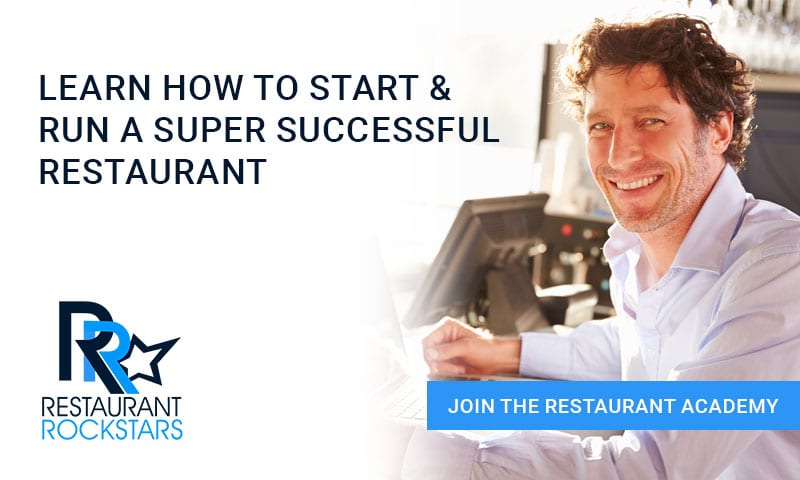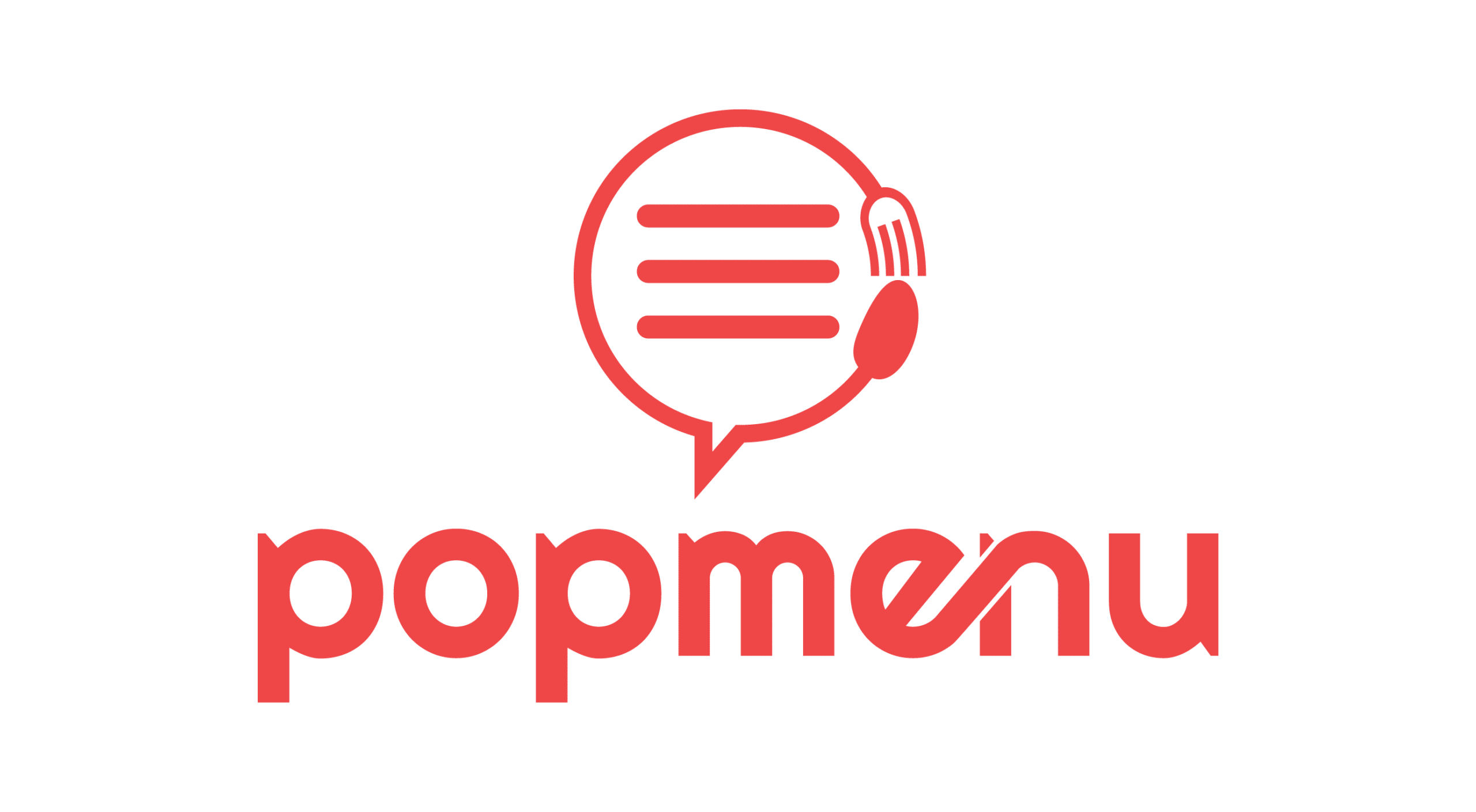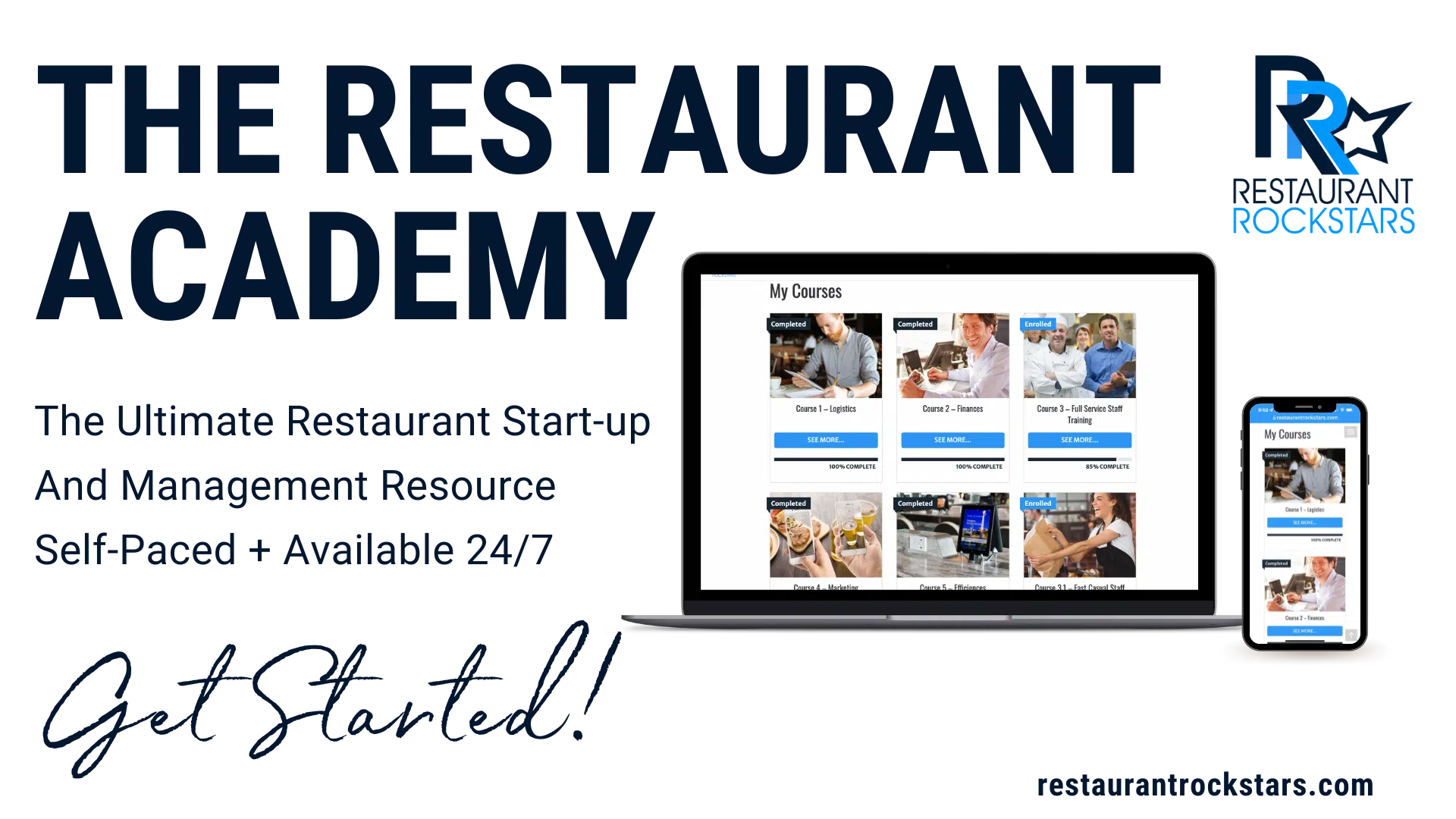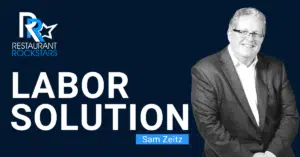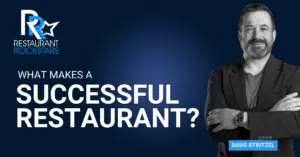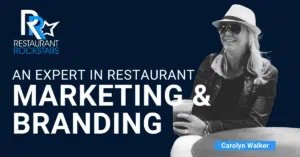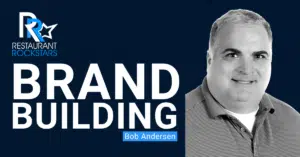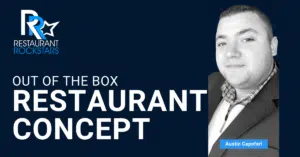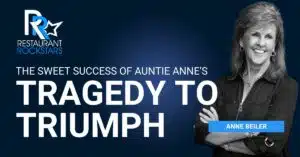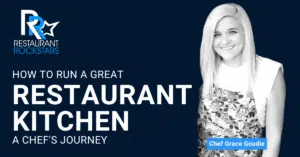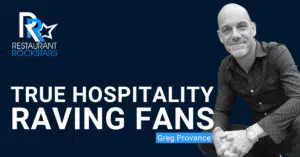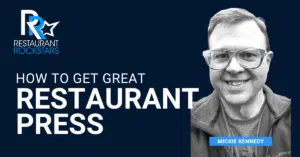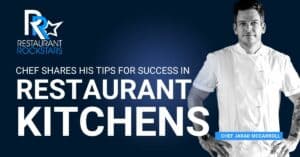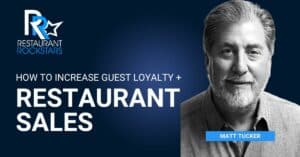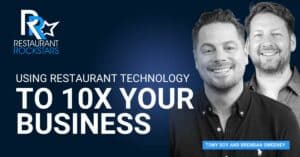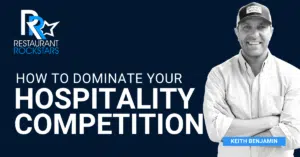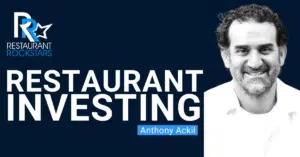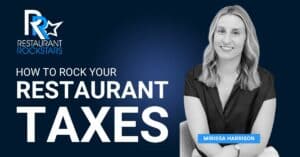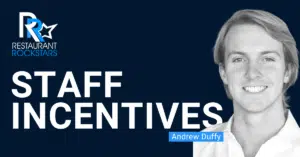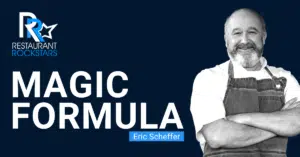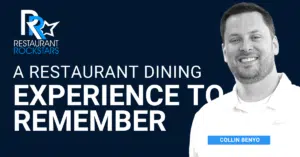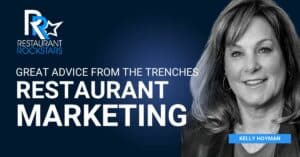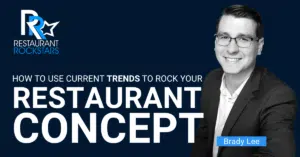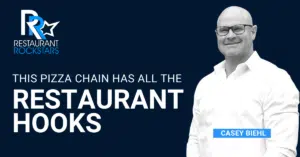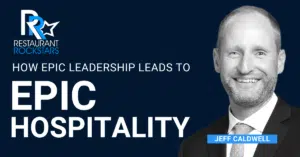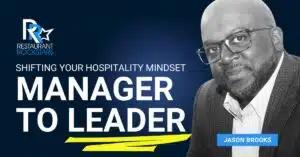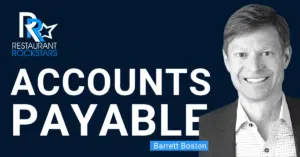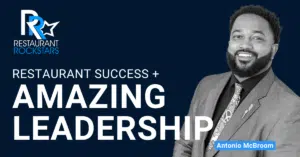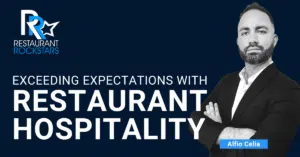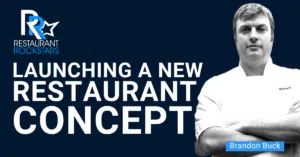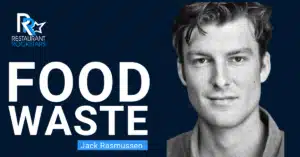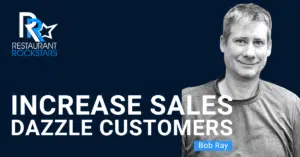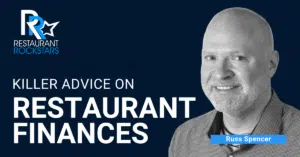Restaurant Rockstars Episode 363
How to Lead and Grow a Great Restaurant Company
LISTEN HERE OR ON YOUR FAVORITE PODCAST PLAYER
The restaurant business is one of relationships. If we consider our team, our suppliers, and guest’s partners and friends instead of employees, vendors, and customers, we have a true formula for success.
In this episode of the Restaurant Rockstars Podcast, I’m speaking with Tom Krouse, the CEO of Donatos Pizza, a dynamic concept leading its segment with 460 stores. It’s not the number of locations that counts, but the relationships they foster and the value proposition they offer their guests through great people. It all starts from the top,
Tom learned hospitality at an early age shining shoes in a golf clubhouse, worked his way up through the Wendy’s organization before taking a leap of faith with Donatos. Despite great stories and a lifetime of memories, he has only looked forward.
Watch or listen as Tom talks about:
- Early conversations with Dave Thomas, the Founder of Wendy’s
- How to not only compete, but dominate in a most competitive food segment
- Delivering true value to guests and never skimping on quality
- The true meaning of leadership and importance of company culture
- Having a marketing mindset for business success
- Maintaining margins while maintaining consistency of product and experiences
- Doing the right thing, setting an example for the industry, and giving back
And of course, my favorites, Tom’s “one question to ask your employees”, and his words to live by: “Alignment”, “Plan” and “Execution”. You’ll have to listen all through the episode to find out what this can mean for your operation.
Don’t miss this episode, then go out there and ROCK your Restaurant!Roger
Connect with our guest:
LinkedIn: Donatos Pizza
Instagram: @DonatosPizza
Facebook: @DonatosPizza
TikTok: @DonatosPizza
LinkedIn: Tom Krouse
Episode #363 Summary
- Hospitality, salesmanship, and service philosophies. 4:22
- The importance of salesmanship and hustle in their early jobs, including using a creative solution to make more money as a busboy at TGI Fridays.
- The importance of service in the hospitality industry, citing his own experiences with connecting with members and building relationships that led to future opportunities.
- Career paths, starting with majoring in elementary education before switching to business after reading salary surveys.
- Marketing and business experience in the food industry. 10:23
- Career path in marketing and business, highlighting their experience in advertising and understanding of customer motivation.
- Experience working in advertising in Los Angeles as an account executive, emphasizing the importance of marketing experience for a business career.
- McDonald’s hired a PR firm to compete with Wendy’s in their home market, leading to successful account wins and exposure for the firm.
- Marketing career and working with Dave Thomas at Wendy’s. 14:50
- Experiences working with Wendy’s, including buying an ad agency and working for the company directly.
- Dave Thomas as a mentor, who walked him on Lexington Avenue during TV commercial shoots.
- Thomas was genuine, simple, and a tremendous judge of people, quickly assessing and getting the best out of those around him.
- Career growth and leadership lessons. 18:55
- Nervous as all could be, sitting on private jet with Senior Vice President of Strategy and Dave Thomas, describes project to them.
- Thoughts race through head on plane with CEO and founder of Wendy’s, wondering how to make impression.
- Tom joins McDonald’s after leaving Wendy’s, falls in love with company and founder’s daughter.
- Pizza industry, competitive advantage, and market segmentation. 23:42
- Joins company with 130 stores, McDonald’s sells it to the founder’s family after stock hits low, and the company is later successful.
- Pizza category has a “perfect whitespace” for a high-quality, convenient brand.
- Pizza quality, consistency, and menu innovation. 28:12
- We weigh every topping to a 100th of a pound, ensuring consistent portioning and quality across all locations.
- Customers expect consistent Donato’s Pizza quality and portioning regardless of location, making edge-to-edge toppings a key differentiator.
- Pizza chain prioritizes quality, financials, and innovation to drive growth.
- Catering to dietary needs in the food industry. 32:37
- The importance of finding the right combination of ingredients for a gluten-free, dairy-free pizza crust.
- “We’ve got a great menu team who stays ahead of trends and offers something for everyone, even with dietary needs and restrictions.”
- “It’s a real balance between pleasing everyone and offering something new, while also being aware of trends and dietary needs.”
- Company culture and leadership at Donato’s Pizza. 37:43
- Prioritizes fulfilling the company’s cultural mission and allowing the team to take the lead, while avoiding micromanaging or getting in the way of important tasks.
- Tom values work-life balance and incorporates healthy habits, such as working out every day, into his routine.
- Jim Grote, founder of Donato’s Pizza, started the company at 19 years old after working at pizza shops and noticing that treating customers and employees with respect led to long-term success.
- Grote’s mission is to use pizza as a vehicle to create something bigger, such as providing job opportunities for young people and promoting goodwill.
- Donato’s Pizza CEO Jim Grote emphasizes the importance of giving back to the community through hiring people with criminal records and supporting a nonprofit organization in Columbus.
- Grote distinguishes between managing and leading, highlighting the latter as a higher purpose that involves inspiring and motivating employees to be their best selves.
- Leadership style and restaurant management. 45:23
- The importance of clear expectations and accountability in leadership, citing examples from his experience in the restaurant industry.
- Highlighting the need for leaders to be clear about their vision and for team members to understand their roles and contributions to the organization.
- The importance of accountability in leadership, citing examples of how he holds his team members responsible for their actions.
- Their philosophy of “A-PE-E,” which stands for alignment, plan, and execution, with a focus on accountability.
- Alignment is key to success, but without a plan, execution is impossible.
- Without accountability, even a well-aligned plan will fail to achieve objectives.
- Marketing and branding for a pizza business. 53:21
- The importance of empowering employees and building a strong foundation for the business, allowing it to run smoothly even when the owner is not present.
- The challenges of marketing a pizza business in a crowded and competitive market, with a higher price point than commodity-style competitors.
- Balancing sales and unique selling proposition is crucial for success in the food industry, especially when dealing with volatile food costs and maintaining margins.
- Finding the right balance between quality, value, and marketing expenses is essential for a food brand to stand out and maintain its leadership position.
- Pizza business model, supplier relationships, and cost management. 58:31
- The challenges of managing food costs and labor inflation in the pizza industry, highlighting the importance of finding ways to reduce hours in the restaurant while maintaining quality.
- The need for an economic model that works, including hedging cheese prices and making own dough, while operating at a net income breakeven to maximize franchisee profits.
- “We treat our business partners like partners, not vendors. We prioritize relationships over price and value long-term partnerships.”
- “Our suppliers bring us new ideas and are more likely to help us during shortages because of the relationship we’ve built.”
- Leadership, culture, and franchise opportunities at Donato’s Pizza. 1:03:32
- The importance of building strong relationships with suppliers and employees, citing a 96% retention rate at his restaurants.
- Advises against complaining and instead encourages positivity and solution-oriented thinking.
- The importance of asking employees for their opinions and ideas to improve the workplace and increase productivity.
- Their philosophy of being a “helper” and providing resources to employees to help them achieve their goals.
- Donato’s prioritizes quality ingredients and customization, scaling through franchising with low-risk deals.
- Running a successful franchise with a focus on leadership and culture. 1:09:35
- The importance of leadership and culture in a franchise business, highlighting the need for someone who is willing to get involved in the community and treat their people well.
- Their experience working for the Grote family and their company, which is 60 years old this year and still going strong with the founder’s legacy.
- Insights on running a successful restaurant business.
Full Transcript
Welcome back to the restaurant rockstars Podcast. I’m so glad you’re here. Thanks for tuning in my conversation with Tom Krause, the CEO of Donatos Pizza was just off the charts on point Tom and I had so much in common to start, but his operating philosophies and best practices and everything he shared is so applicable to running your business today. And I was so excited. But you know what an acronym is an acronym is where letters spell out individual words. And when you put them together, they really mean something powerful. Well, Tom has an acronym, which is APE, and that stands for A where A equals alignment. And P is for plan, and E equals execution. And I believe this is applicable to any restaurant, your business and really life in general. So we talked all about that in addition to marketing, and finance, and dialing in cost, but delivering value, there’s a super value proposition here at Donatos. As well as you know, best practices and how to get the most out of your team. We talked about leadership, just all the things that we feel are super vital in business today to deliver amazing guest experiences. And that’s what it’s really all about. Thank you so much, Tom, and thanks to our sponsors for tuning in. And also, we talked about systems. So if systems are important in your business, check out the restaurant rockstars Academy, it’s literally a tool, a training tool where you can give access to up to 25 employees within a location and teach them how to run your business as if they owned your business. And that is a very powerful formula. So you’re not gonna want to miss this episode. Please stay tuned.
You’re tuned in to the restaurant rockstars podcast powerful ideas to rock your restaurant. Here’s your host Roger Beaudoin.
Rock Stars, there are many elements to consider when growing your restaurant. are you connecting with your guests enough and with the right message? Could your kitchen put out more orders than your dining area has room for? Well, it can be overwhelming, especially when the reason you got into this business was for the people and the food. That’s why restaurants get pop menu. Now pop menu is the marketing tech platform designed to make growing your restaurant easy so you don’t have to grow it alone. With pop menu, you can capture more guests and their preferences through your website that’s designed to easily collect data and info so you can see what your guests love and why they dine with you. Connect and build authentic relationships with guests by using modern technology that personalizes your marketing. Make all your systems work better together, improve margins and conquer the chaos of your restaurants digital presence. Now pop menu has a special offer for my listeners. Get $100 off your first month plus lock in one unchanging monthly rate at popmenu.com/rockstars. Again, go now to get $100 off your first month at popmenu.com/rockstars.
True hospitality and guests convenience are vital in your restaurant. I’m proud to say that for 23 years my restaurants provided both with paging equipment by J tech. We use guest and server pagers and my team’s could not have delivered great dining experiences without them. J tech systems help you run a great restaurant. Now J tech pagers are reliable, durable, easy to setup and operate. Guests pagers increase sales and give guests peace of mind knowing they’ll be called when their tables ready. Staff pagers notify when orders are up fresh and ready and save time by eliminating the need for servers to check on orders. J tech also offers Motorola two way radio solutions, QR code virtual paging, reservations management, curbside notifications and coming soon LinkWare a wearable watch like SmartBand that can receive messages and tasks from the J tech LinkWare application. Now I saw this product at a recent food show and it’s really cool. To learn more and get a special offer from J tech exclusively for my listeners. Go to www.jtech.com/rockstars. That’s spelled jtech.com/rockstars.
Tom, how are you today? Welcome to the show. So glad you’re here.
Hey, thanks. Thanks for having me.
Well, you’re an illustrious guests being the CEO of Donatos everyone’s heard of Donato’s is arguably one of the leading pizza chains. And we’re gonna cover all about success stories but as my audience no I love to go back and see where hospitality began for you. So tell us take us there.
Wow, where did hospitality begin for me? You know what probably my very first job I was 13 years old. And I was hired as the shoeshine boy for a golf club, where I grew up. And you say hospitality is and hospitality? Well, it In many ways, I was serving all the men in the men’s locker room. And I was trying to get them. I was trying to drum up business. So I was actually learned a lot about just interacting with people and selling. I ended up making way more money than the caddies did. I made a lot more money than anybody else that was working, like in the restaurant even there. So I started, I started, I guess you’d call it more of a sales oriented kind of position. I worked as a dishwasher in three different restaurants when I was 15. And then probably my first kind of full full on restaurant for a house jobs. I worked for TGI Fridays as a busboy. And it was this was in the hay day. So this was like, I say, hay, day, meaning that when the bar was like the place to be and, and it was a place where guys and girls met, and it was like four deep on a Friday night at the bar at Fridays. So I was the inventive busboy who figured out that mostly guys were trying to impress the girls and they were buying them drinks and they’d pull money out of their pockets and it would all fall on the ground. So I took you know, the broom and dustpan that the handled bro.
yeah, exactly. flip that down, take the broom, sweep it in, dump it in the trash thing. Yeah,
I put a I put a pin light onto the broom handle. So that when they and I, and they were like, you don’t need to sweep during the rush. I go, that’s where I don’t go in there. And I let me clean up and I turn that light on and I’d find money and sweep up. I’d make about $25 just sweeping up. So. So I don’t know if I’ve told you yet about hospitality. But I certainly told you about salesmanship and hustle. Let’s put it that, way
you know, it’s so interesting. You say that because our backgrounds are very similar. I started my very first job as at a country club. It was a private club. And similar to you mentioning the locker room. It’s like this was the private clubhouse, you know, and they’d come in after the first round of golf for lunch. And it’s the 19th hole they call it. And now I’m serving them drinks. And I very quickly got to know all their names. And it’s Yes, sir. And Mr. So and So sir. And, and I got to know what their favorite drink was. And I’d have it poured before they got within 10 feet of the bar. And that was hospitality. And I didn’t do it because they trained me to do it. I just felt this personal point of pride maybe to deliver what I consider to be great service to the members. And I was rewarded handsomely for that as you were so
isn’t that. Isn’t that cool? How that that works, though, because you learn at a very early age that if I connect with, and it’s not like you were faking it, I mean, you were connected, I
was genuine, it was relationship building. I think even back then, like I’m a big networker now. And that’s one of the reasons why we get so many great guests on the podcast, but literally back then, who knew where these relationships would lead, you know, knowing prominent people, business people in the community, it led to future jobs that lead to other opera, you know, recommendations for colleges, all that kind of stuff. It was great.
Wht did have? Did you have any good stories of anybody that you met early on that showed up later in your life? In a big way?
Yeah, there was a guy who was he was the managing director of a large real estate company. And he gave me a job throughout college that that was a pretty great job. I studied business in college. And so I got some ground floor experience in marketing and business relations while I was in college. So yeah, that was one of the members, I still remember him to this day, great guy. So you know, it really is about that. And that is hospitality, really. But I think I have to emphasize, you know, unfortunately, when we go out to restaurants today, service levels have slipped for a variety of reasons, you know, the pandemic, and the labor crisis and all of that. And unfortunately, restaurants have not been able to deliver as much on the value proposition being short staffed. But where I’m going with is it’s unfortunate that there’s sometimes a sense of entitlement where, you know, tipped employees think that just because they’re bringing the food, they deserve a 20% tip. And it’s not about service, it’s just about going through the motions of the job, and I’m entitled to a tip. And I’ve never believed that I’ve always believed that gratuity is earned and if you deliver exemplary service, then you deserve a nice tip. And if you fall short, and it’s your fault, then you don’t you know, and we see this every day today. So, you know, service is is paramount in our businesses, you know, and we’ll we’ll be talking all about your service philosophies. Also. What happened then, tell us about your career.
So I went to Ohio State and I initially majored in elementary education. I’ve always been like a, like, you know, as a playground leader, I was a little league football coach, I was always I really enjoyed and still do enjoy kind of boiling concepts down and teaching people things. That’s in fact, that’s what I really do in my job today, is I can try to connect with people and, man, if you didn’t connect with 12 year old boys who are going through hormonal changes on a football team, you can probably connect with people in business later on in life. So, anyway, but so I thought I wanted to be in elementary school, in fact, so I majored my first two years in elementary education. And then I read a survey about the salaries that you can get as a teacher versus other things. I said, you know, I think maybe I’ll go a different direction. So I ended up really going the route of marketing and business. So I majored in Business Marketing, and Ohio State got a degree there, and ended up working for ad agencies for the first third of my career. So Wow. And and, and interestingly, most of the most impactful clients that I had were in the food business, so so that kind of brought me into restaurants from really from a brand side less about an operation side, but more, you know, understanding customers understanding what motivates customers, understanding what how you get their attention, certainly how to get them to come back, that kind of a thing really started from working for ad agency, we had a couple of food accounts. And then I, I left this initial agency and ended up being partners with another guy that was at the agency. So at age 24, I was a partner in a small communications firm in Columbus, Ohio.
One more thing in common I worked in advertising in Los Angeles, I was an account executive on the Acura car business.
Is that right? What agency? Was it?
It was called Ketchum communications.
Oh Sure, yeah
Ketchum La had an office on Wilshire Boulevard, I think they were based in Pennsylvania, probably in Philadelphia. If memory serves right. This was 1990 to 1993. So that this takes me back aways. But yeah, similar, you know, getting marketing experience was was essential to a business career. And I had a great time a great experience and learned quite a bit and, you know, account executive, you’re in there between the creative side and the account side and dealing with the client and presenting creative work and trying to sell it forward. And it was awesome, great experience.
Yeah. And you know, you’re also if you can try, you have to boil that let’s let’s use a 30 second television commercial as an example, you have to understand what problem you’re solving, you have to boil down that communication, that selling at unique point of difference in a short period of time, that’s compelling enough to get someone to act. If you can figure that out on on a pretty consistent basis. You can probably lead a company, you could lead a department, you could lead a store, I think it really gets you to think kind of sequentially, what problem am I trying to solve? And then how do I quickly get people motivated to get to that point, so I thought it was tremendous. We had we started our little agency or one of our first big accounts was we were hired by the local Co Op McDonald’s co op in Columbus, Ohio. So McDonald’s, always their public relations for efforts were always part of their, you know, traditional agency of record. So they didn’t have a separate PR firm. We were the first PR only firm that they had hired anywhere in the country. Why you ask well took us a little while to figure it out. But they wanted to stick it to Wendy’s in their home market. That’s why. They they found this young and hungry and we were young and PR firm to get noticed in Wendy’s. I call it the competitive nature of restaurants. I don’t know. But so we ended up you know, we did a real good job. We, you know, I remember we introduced salads, when McDonald’s introduced salads, we had a, we held a wedding between a guy dressed up in a salad and the girl dressed up in a salad dressing on the oval at campus at Ohio State got a whole bunch of publicity. We kept getting all these stories. And then about a year later, we slowly start picking up these different accounts. We picked up shoes. A Local shoe store, we pick up a leasing company, we pick up our rustproofing company, we’re like, hey, you know we’re doing good. Picking up all this business? Go Come to find out a look into some of the financial backing of all these new accounts. And Dave Thomas’s investment company was a part of all these accounts. Well, as it turns out, Dave, as a classic entrepreneur is going to solve three problems with one move. So Wendy pigtail Wendy was graduating from marketing
That was his daughter, right?
Yes, his daughter. I went to high school with her actually,
no kidding. There’s add him to fame. Yeah.
And she she was graduating from University of Florida in marketing. So his thought was, I’ll get these guys out of my hair, I’ll buy their agency, Wendy will be their CEO. And they’ll quit doing a bunch of PR for McDonald’s all at once.
That’s an awesome story, that is fantastic.
We ended up picking up more and more McDonald’s business and then the agency dissolved and we went our different ways which, interestingly, my next step was along the Wendy’s route. And I had a long career with Wendy’s and their agency.
Oh Okay. So different positions within that organization?
Yeah, so we went when, when our little agency dissolved, I had my own business for a little bit and there was a gentleman in town who was picking up all the local marketing business for Wendy’s. Wendy’s had changed ad agencies from dancer Fitzgerald sample, if you remember that name, to Backer and Spielvogel which was a big New York firm. And they didn’t want the, you know, the radio tags and the signs and the POP and all that stuff. So he put together an agency for that. So I joined him. We eventually were bought out by Backer and Spielvogel . So I worked on the agency side, on the Wendy’s business, it was purely for Wendy’s and did that for a few years. And then Wendy’s recruited me hard to come work for them. And I ended up working there for about 15 years, I was vice president marketing when I left Wendy’s. So I worked with Dave Thomas Hand in Hand personally worked with him directly during the big campaign with with Dave Thomas was fantastic.
And the burger wars, right?
Exactly. Yeah. best burgers in the business as he used to say best burgers in the business.
Love it. Love it and the square burger.
That’s right. He’s, he used to say the reason that they’re squares. We don’t cut corners. He was very corny.
Oh I like that. No kidding. Yeah, there’s a hook for you.
That’s yeah. He was an amazing person. I was very fortunate to be able to work with him.
Wow. Well, you would you say he was a mentor in any way.
He was. I mean, we didn’t have as you know, I was I was a young junior executive, I would, I would go with him on the television, commercial shoots, his wife was was on him about his weight. So she made him walk every day. So when he would go to New York to go on these TV, commercial shoots, they’d say Dave wants to go for a walk around the block on Lexington Avenue. Krauss you go with him. So I I have the job. I used to walk Dave Thomas. That was one of my jobs was pretty cool. But what what an amazing guy, I don’t know if you ever got a chance to meet him or
Never did. Never did. But what amazing, interesting conversations you must have had, right?
Oh my gosh, yeah, he was, ya know, he was he didn’t graduate from high school, he was adopted. He he you know, he would use the wrong words for things sometimes. And at times, I thought, you know, is he is this is this all an act, but he was just he was genuinely you know, simple in the business. He took the complex and really made it simple. And he was right on about all of it. And, and not just not just about the business aspects, but about people. He was a he was a tremendous judge of people, he would quickly kind of assess who you were, and what you know how to get the best out of you. My first week on the job. I was told you’re going on a plane. This is when I got hired by Wendy’s. So I came on to Wendy’s and you’re gonna fly on the company plane with the Senior Vice President of the Strategy, and somebody else and Dave Thomas, and you’re going to fly to talk to this franchisee about something he was doing, they shouldn’t be doing. So I’m nervous as all could be. I’m sitting on the private jet. I’m on the jump seat. You know, like writing scribbling, and I can feel that somebody’s looking at me. You know, I got I can tell there’s eyes on me. And I look back and Dave’s just kind of staring at me. He says, he says so what do you do? You know, I’m so nervous. I go well, I’m a Junior Assistant, new product marketing manager. He says, So what do you do? Awesome. So I thought I’ll describe. I’ll describe a project for him. So I go into detail about we’re going to test the big classic cheese burger and we’re gonna have two stores, there’ll be controls, and then we’ll have test stores. And we’re going to put a second slice of cheese on it, we’re going to measure pre to post, blah, blah, blah. And I’m like, you know, I’m, I’m dying. He goes, so you’re going through all of that, to find out whether customers want more cheese on their cheeseburger. And I went, oh, boy, there’s a lesson, right? You asked me whether I learned some lessons. There are some lessons right there, you know, don’t don’t make things more complicated than they really are.
Unbelievable. Wow, that’s amazing. Yeah, I can totally feel the pressure. I’m on that plane with you. And I’m like, Okay, I’m a young person. And there’s the CEO and the founder of Wendy’s. And he’s looking at me funny. And my first thought being on a plane is, you know, should I be really outgoing and engage people in conversation? Or should I just kind of, you know, be seen and not heard as a young person with senior executives. It’s like, all these thoughts are going through your head. It’s like, do I make an impression positively? or negatively? What should I do this or that? And it’s like, wow,
that’s exactly yeah. And I thought, I’m just gonna sit here because they don’t want to talk to me, and who wants to talk to me, the founder of the company wants to talk.
Awesome, thats great.
It was amazing.
What happened next? What happened after Wendy’s
So yeah, so I joined Wendy’s and I worked, you know, my way through the marketing department, you know, lots of stories there. But I ended up, I was kind of second in command to their CMO at the time, and the nachos had just been purchased by McDonald’s. So back in 1999, McDonald’s bought, controlling interest of Chipotle, they bought Boston Market outright. And they they bought a pizza company, because they wanted kind of like Yum, brands, they wanted, they called it share of stomach, they wanted to own a share of stomach,
right. And all relevant categories, and only relevant categories.
Exactly. And and with us Donatos, they were looking for, you know, quality, they were looking for the culture or the people and as a family run business, which I’ll tell you a lot more about our culture here, which is amazing. But yes, they saw it and they liked it. And so, so they quickly, we’re building their team to take over the world, you know, and so I was approached while I was at Wendy’s, I was happy at Wendy’s super happy actually, the only hitch was my, my, the CMO who I would eventually hopefully replace was only five years older than me. And I thought gosh, no, no, this could take forever. And I can I could go over here and lead this organization, also a quality brand. Also founder, started founder, LED. Still Columbus, Ohio, I didn’t have to move made sense. You know, all the resources of McDonald’s. So I made the tough decision to leave Wendy’s and join this Donatos as I tell the story. When I was young, I fell in love with Donatos Pizza, the pizza itself. Then I fell in love with their job offer then I fell in love with the company. And then I fell in love with the founders daughter who is my wife now. So
No kidding now there’s a story into into itself.
Oh, wow. All the way to the executive suite. And I married the founders daughter.
Exactly. You know, I like to complete the job. Let’s go all the way. So that didn’t come to later. So I joined in 2000. And I was McDonald’s owned us for four years. Long story short for them, their their stock hit an all time low. And Wall Street really was pressuring them, like get focused on your core business, even though we weren’t really a real distraction that we were at least a perceived distraction to Wall Street. So so they ended up selling Chipotle Boston Market. And they were going to either sell or close down Donatos. And my wife wasn’t my wife at the time. But the daughter of our founder, Jim grouty, went into her dad’s office. You know, I know Dad, you sold this and that’s the American dream and all that but we got to buy it back. She and the way she tells the story. She said, Dad, I need you because you’re smart. I need you because you’re charismatic. But mostly I need your money. And so because I don’t have enough to buy it back. So so the family bought the company back. I stayed on I’m a I’m one of the owners of the business. And we’ve been on a real run ever since. So
do you recall how many stores there would have been when you joined, and then McDonald’s four years later sold it and where you are now just sort of kind of
About 130. When I joined they, McDonald’s got it up to almost 200. But then had they closed down three markets. They were, you know, they were taking a ride off and, and there were a couple of mark their strategy, which was similar to McDonald’s strategy, like international, they go into a market. And they just build and build and build, they’d lose money for 10 years until they, you know, had the market share. And then, like France was a great example of that. They were doing that with us. But the problem was midway through the process of entering markets, they changed their strategy. So we ended up selling the Atlanta market, silly market in Orlando. So now we’re back in not, we’re not in Philly, but we’re back in Orlando in Atlanta now. So we’ve got about 460 Total locations today. A couple 100 of them are traditional. About 250 or so are part of Red Robin, which I don’t know if you’ve heard of,
yeah, we have a Red Robin down the road from us. Yeah, yeah. They had a female CEO, if they still don’t, didn’t they?
Yeah, they did. Denny post, she was actually she was the person that reached out to us about the idea of doing some sort of partnership. And, you know, that was maybe five years ago, she’s moved on. GJ Hart is their CEO. Now he was with Texas Roadhouse for a long time torchies tacos, California Pizza Kitchen. So there’s a little bit about pizza, which is great.
Let’s shift gears a little bit. Let’s talk about in such a saturated segment, pizza, of course, what’s your competitive advantage?
Yeah, so we’re, you know, we’ve got the distinct advantage of having a clear point of difference in a big category. I love that, you know, the upstart, the new ideas, the new categories, they make me nervous, because they may not be as exciting a few years from now. So pizza’s certainly established, it’s about $50 billion category, where we, where we stand on the in the consumers mind, and we did a lot of consumer work. And customers really kind of bifurcate the market into two chunks. One, they call it default pizza, and no offense to Domino’s, or Papa John’s, or Pizza Hut. But it’s more chain pizza. The quality is not the best highest quality, but it’s it’s good enough. But it’s convenient, it’s got a value you know, technology has evolved. So that that’s like easy. And then over on the other side, they would call it local goodies. They might be mom and pops. Or they might be kind of some of these younger upstart, you know, more hipper brands, which the quality is strong, but they don’t have the convenience, the delivery, the value, the technology, we’re in this perfect whitespace that we’ve got a super high quality product. And we’ve researched it against just about every pizza in the business. And customers tell us that it’s we have lots of toppings. We call it edge to edge topping. So thin crust, toppings on top all the way to the edge, like a pepperoni pizza has a lot of pepperoni on it. And people say what’s a lot 30? I got no 40? No, it’s 100. We have 100 pieces of pepperoni on a large pizza. And that’s just unique in the marketplace.
It is let me ask you a question about that. So portion controls, especially in this age of rising costs, and inflation and food costs and all that kind of stuff to maintain margins. Are those pre portioned pieces of pep, like how do you? I mean, I’m sure that guy’s not counting 123 and putting 100 pieces on there. Like how do you do that? And how do you maintain consistency?
For awhile we while we only hired math graduates from Ohio State? No, I’m just kidding. No, actually, it’s a great question. Because our system is we weigh every topping to a 100th of a pound. So when a ticket comes in, it says you know, banana peppers point four, you know, yep. So, so we weigh the pepperoni until it hits the weight and we know that that weight equals at least 100 pepperonis or more so that the great thing about the system is depending on inflation or commodity costs or operational excellence or whatever. We’re going to have the same pizza every time you know it’s not a franchisee isn’t going to, you know, take a scoop and go and let’s maybe put half the scoop on here this time. Because I’m dealing with a bad month last month it’s it’s the same product every single time. So, so customers and they notice it.
Oh of course they do. Yeah, same. If you’re a fan, it’s like you expect it to be consistent in Orlando, Columbus, San Francisco, it’s like wherever you go, it’s like you want a Donatos Pizza to be edge to edge exactly as I had it the last time regardless where I had it.
Yeah. And it’s, you know, it’s very, it’s a beautiful looking pizza, because you know, it’s got all these pepperonis on it. And so, So quality is the main piece, but we’re great at delivery. And, and an online ordering is about 80% of our business. So we’ve got a great technology platform, we’ve got a great delivery, we’ve been doing delivery forever, a great delivery platform. And so that piece in the middle, you got the default pizza over here and the local goodies, we call it premium pizza delivered is kind of what our, you know, that’s not an ad slogan. But that’s really what our positioning is. Great question. But that’s, that’s why that’s why we do in the top 90th percentile of volume of other pizza places most average pizza place in America is about an $800,000 AUV and we’re, you know, well over 1.25 or 1.3. And that’s kind of the basis for our our recent growth spurt has been great quality, great financials. And now we’ve got scale to go nationwide,
do any LTOs or how often do you sort of do menu r&d, focus groups, bring in new products or new pizzas, that sort of thing, just to keep it fresh and round out the regular consistent menu?
Yeah, we do. We, you know, we want to make sure we’re balanced that we’re not going too hard on all new products all the time. But I would say probably half of the marketing events in the year has something new. And you’re not. They’re not always you know, the highest sales we’ve ever seen. But they communicate something also about the brand. You know, when we’re, when we’re doing something that is a little bit on the cutting edge in food that says something about who we are, you know, we add fresh, fresh mozzarella balls or our Hawaiian pizza has cinnamon and sliced almonds. They’re kind of market type ingredients that you’re not always going to see. And at least you’re not going to see in the big chain pizzas. So yeah, we are probably our most successful introduction of recent years has been our cauliflower crust pizza, which I gotta be honest, and my gray hairs showing my age here. But I thought cauliflower crust,
My wife would be all over that.
Oh my gosh, it is so good. You know, we, we it took us a little while to find the right combination, but it is so good. And it’s gluten free. And it’s got a health halo and it’s a little bit you know, kind of food forward. So it’s been a good one.
Listen, when I ran restaurants, I had my core values the things most important how I ran my restaurants, monitoring daily operations, training my team for consistently great guest experiences food safety, quality assurance and preventative maintenance. All this took a system. Well, here’s what Xenia can do. Xenia gives you a modern app, really an operational Basecamp that scales standard operating procedures, trains, your team controls operations, and even manages food safety. Now I really like their sensors that continuously monitor temperature for fridges and freezers so you can proactively prevent inventory losses. Now, how valuable is that? Now whether managing a single or multiple locations, the Xenia app helps you ensure consistency, compliance and accountability across your operation. You can see full detail in real time from anywhere in your Xenia dashboard with automated reports right to your inbox. Now again, this was vital in my restaurants. Xenia is offering my listeners white glove service with free onboarding and implementation. So you can jump straight into immediate usage and value Xenia start to just $69 per month per location. So get my special deal at www.Xenia.team/rockstars. Xenia is spelled Xenia.
So I mentioned this because my wife is gluten free, but she’s also dairy free. And you know, she uses a cheese called Daya, which is like a dairy free cheese. I don’t know how big that is. But is that something that you need to have both a gluten free crust and sort of a dairy free because you don’t want to lose that segment of people that are either lactose intolerant or they just for health reasons. They just cut back on dairy.
You know, it’s a constant job for us to find the right intersection. Is there enough of a need exactly right? Because, you know, if there’s not enough of a need to make sense, it ends up you end up throwing away more product than you’re selling and so we got to be sensitive to our operators about those kinds. names of things. But you know it, I’d rather be a little bit ahead on all that because, you know, if you measure the trends, and you know, when the trends like gluten free, we were ahead of about everybody. And at first it wasn’t that big of a sales mix, but it’s grown and grown and grown. Cauliflower is the same thing. So we’ve tested a diet cheese, and we’ve had it in a number of stores. I think it’ll probably come back at some point in time. But, you know, these foods sensitivities are real.
They’re real. Yeah. And it seems like there’s more and more popping up all the time. And obviously, you can’t please all the people all the time, we really try to offer something for everyone. And if they’ve got dietary needs and restrictions, you know, you want to be known for that, as opposed to No, we just do it one way. So you’re right. It’s a real balance out there.
Yeah, it really is, I think can be very difficult for some people. I mean, people in the worst case with like, not allergies or, or, on the other hand, people with celiac disease, like we were, I want to say 20 years ago, we introduced pizza with we call it no dough, it didn’t have a crust. It was it was really one of the first kind of bowl ideas. So it was all the toppings without the without the crust. And people we got these most heartfelt letters from people who suffer from celiac who, finally I can have pizza again, finally, I can be with my family, you know, when they want all want to go out and have pizza, because a lot of times people, you know, a lot of them are kids or you know, feel left out. And so yeah, there’s no dough pizza that we did years ago just took off. We ended up being on the Today Show.
That’s great marketing.
Yeah well, it was funny because it was right at the height of the Atkins diet. You remember the Atkins diet?
I absolutely do. Yeah.
And we were we can’t walk past the conference room where there people were eating pizza, we’d see all these crusts left on the table. We’re like, Is there something wrong with our crust? And no, it was all these people on the Atkins diet. And so we kind of this no dough, we hit it at just the right time.
No kidding. took off
I mean, yeah, six months earlier, probably would have been a bust six months later might have been a bust, but it took off. Those are fun times.
Yeah. Then there’s a fine line between Okay, when do we cut this because the trend is over. And it’s not going to continue without, you know, continuing go down that road. So god its a balence.
yeah, we’ve got a great menu team who, you know, they stay ahead of it, and they’re very well educated. And yeah, you know, we’ve got a few interesting things in the works right now. So we’re, there’s always something
you know, I’m sure there’s no two days alike in your world, but what’s a typical day, like for Tom Krause.
Typical day? Well, I do, I’m doing a lot more in the community on I I’m a musician of sorts. I’m a songwriter, and I’m involved in a nonprofit here in town that helps support musicians and helps Columbus get recognized as a Music City, which it really is. So I do I do some work with that. So I have a varied day, I might, I might be at a club, watching a young band trying to help them late at night, you know, one night and then the next morning, I’m, I work out every morning. So I’m up early. And then I get into the office, I’m always in the office, I work at home sometimes, but not that often. I like being here. I’m I meet with our President and our CFO and Jane, my wife, pretty consistently, I’m not in one team meeting now, because I’m trying to allow the team to really kind of take the lead. My job really is to number one, make sure that we’re fulfilling our overall cultural mission. Number two, that we allow the team to build plans that will achieve the results that we want to get. And the third is to take away barriers that exist so that people can achieve what we already said, we’re achieving. When I when I drove me crazy is working for past bosses who micromanage or gotten away or just came up with new things that got in the way of the big rocks that we were working on. So I’m real sensitive to that. And so I’m, I’m a helper, I guess is what I would say my job is to really be a helper.
Sounds like you’re finding a work life balance. We talked about working out every day doing healthy habits. You’ve got a vocation in music, you like helping outside the community, all that kind of stuff. So that’s all tremendous. Let’s, let’s go a little bit deeper. Two things came up from what you just said. We talked about culture a little bit. So I want to talk about your company culture. But then I also want to talk about you mentioned the boss and the manager let’s talk about leadership versus management. But let’s start with company culture first.
So, again, part of my decision to come here was, is is it a culture that is meaningful and and Jim grody, my father in law, our founder when he was 19 years old, he started Donatos pizza. He dropped out of a highest state and starred in started Donatos Pizza, because he had worked at some pizza shops, like his first job was cleaning pans at a pizza shop that had two owners. The one owner was the super friendly, affable guy, not unlike Roger at the country club, everybody loved him, the associates loved him, the customers loved him, the other partner was more of the numbers guy and he would calculate and come up and say, you know, if we watered down the sauce, at the end of the night, we can make three more pizzas. And that would make this much more money and blah, blah, blah, blah, blah. And Jim, Jim’s 13 years old watching this. And interestingly, the nights that the first gentleman worked, overtime really started to grow and sales didn’t matter which day of the week it was, but when he worked, and when the other guy worked, it would drop in sales. And I bring the story up, because Jim noticed at a very early age, that if you make a promise to the customer, and you treat the customer with respect, the way you would want to be treated, you treat your people with respect the way they would want to be treated, it may not show up immediately, like on a spreadsheet, but eventually over time, and he, he always called it goodwill, promoting goodwill, if you promote goodwill, it will all come back to you, it will come back to you in spades. And you know, he’s 80 years old right now, he’s he’s still the majority owner of the company. He’s working in an innovation center inventing equipment for pizza making, believe it or not, so he’s not as directly involved in the day to day but but the mission of are we are we allowing pizza to be the vehicle to create something bigger, and it might be small, it might be big. And when I say small, I say, you know, we hire 14,15 year olds, a lot of companies don’t do that, because of all the labor fines that you could get. And it’s difficult. But we know that some young kids, maybe their family life is not great. They’re not getting life lessons that will help guide them and make them successful in the future. Or maybe this is just work as an opportunity to, to hear less than that, like my own son. At a certain point, he quit listening to me, but when he got a job at Donatos, that was a whole nother level for him. So. So it’s things like, you know, we make it a point to hire 14,15 We hire people with past criminal records that we think you know, need and deserve a second chance. You know, it’s we give back to the community, we give you a pizza that’s got more pepperoni on it than it needs to, you know, so we call it a company that gives more than it receives, yeah, we get 16 bucks from you. But what we’re gonna give back is so much more. So this pizza with a purpose is really kind of, you know, I don’t know if that’s a phrase, but that’s, we, you know, and everybody loves pizza, right? I mean, that’s the great thing about the food. But pizza, especially, it’s hard to find somebody who doesn’t like pizza, you might find somebody that doesn’t like octopus, or calamari or something like that. But so it’s such a universal attraction that if we can take that universal attraction and do something good with it, my wife and father in law started a nonprofit in Columbus, that is really changing people’s lives. And if it wasn’t for Donatos, and the pizza, that wouldn’t be happening. And so you ask about culture that that’s the culture the culture is how can we honor what we get to do which is to serve and serve the best pizza by making people’s day a little bit better, might be a little bit might be a lot. But that is more than a transaction. And that kind of leads into your other point about manager versus leader. You know, when I think about when you are saying that to me, you know, I think about me, you know, managing is even the word itself is kinda like I’m trying to like not mess things up. I’m trying to manage a managing it and and it can feel more like a transaction. But leadership is more about bringing a higher purpose. You know, if a leader is going to make someone who works for them on their team, feel valued. And feel great about what they’re doing, and allow them To do more than they ever thought they could do, right? I mean, when I’ll ask you what your definition of leadership is, but I see that as one of the aspects. And, boy, that’s a much higher purpose than managing the p&l, managing inventory, managing the schedule, those are tasks, but, you know, inspiring and motivating people to be the best version of themselves, man, that’s cool.
That’s powerful stuff, you know, when you said, managing, the first thing that came to mind was, I need to control things and including my people, I need to control them, I need to control the bottom line, I need to control this, that and the next thing, and that takes me back to your story about the guy that was a little too focused on the finances versus being affable and, and really being, you know, teamwork respect, and, and inspiring people versus, you know, watered down the spaghetti sauce, or the pasta sauce, or the, you know, the pizza toppings, or whatever it was. But that was a really good analogy that you made, I think that’s the distinction. It’s like, leaders recognize talent, in others, and they give people opportunities, and they don’t criticize, they critique. And they, they try to make people better than what they believe that those people can do on their own. And then when those people reach great heights, then the recognized and rewarded for that achievement. And I think that lowers turnover and organizations, it creates a, you know, a spree decor that used to say, in the Marine Corps and all that sort of thing. And, that’s it, that’s what it’s about.
And it provides clarity to I think, I think the best leaders are clear about, you know, no matter how you create that vision, hopefully you create it with your team. But when you create that vision, it’s clear what that vision is, and, and everybody’s clear about their, what their potential contribution is to get there. That’s it, like, you walk into a restaurant, you own restaurants, the restaurants that run the best are the ones where, you know, the people on the team know, what’s expected of them. And, and they have an opportunity, you know, to contribute to that vision, which is really cool.
Yeah, you know, I think a lot of managers are sort of losing focus. And wondering, why are my people not performing? And part of it is the the accountability isn’t there? Okay, you need to make it crystal clear to every new employee and even existing line people, what is expected of them and giving them a clear direction with a job description that they understand they know they can perform, if they have any questions you demonstrate you show them until they demonstrate competency, but then a really strong leader understands what every position in a restaurant is about. And maybe you could do it yourself. And maybe you can’t, but at least you know what expectations should be. And if those people go sideways with those expectations, that’s when you get the accountability with the clear description that was signed off on hopefully by the employee when he was first hired, or if you’re just rolling out this program, and then you can pull them aside and private. And, you know, this is something I used to do. And I’d say, you know, you agreed that we were going to do it this way. And I’m seeing it going that way. But I never said no go out there and expect you to do it this way. I was threw the ball back in their court and said, How can you get back on track? What can you do to get your performance that we all agreed was what was expected. And now they know I’m watching and they’re gonna go out there and they either have to fix the behavior, correct it to improve, or else they know, I’m gonna see him again, and nobody wants to talk twice about an episode. So that, you know, that’s accountability right there. And then there should be a performance review regular performance reviews that let people know how they’re doing. But then weekly recognition, rewards programs that that really, you know, single people out for going above and beyond and solving a guest issue or delivering amazing hospitality or helping a team member, whatever it is, I mean, we did all these things. And I’m sure Donatos does does many similar things. What are your you know, what are your philosophies on leadership style? And how do you expect you know, store owner franchise ease to onboard people train people and made sure that while they have to ensure a consistent experience through their people,
yeah, you know, I’ve had this philosophy or a theme called eight. A PE, yes.
Okay. What’s that
part of the reason I like it is because it you could be as as intelligent as an ape and understand it, but where I see things go wrong, and this is in a store or in a department or in a company is there isn’t. A stands for alignment. P stands for plan. And E stands for execution, which includes accountability. And when things aren’t going well, it’s one of those three things you might you know, I remember walking into a restaurant like a weekend still and you know, they’re blown up balloons. And they’re putting up banners and for a Kids program and my, you know, so why are you doing that? While they I couldn’t get a clear answer. So were you aligned that the problem that you had is you didn’t have enough families? Is that the problem? Or is the problem that your service times the window are poor, because you can look at that and analyze the business and say, the biggest thing we’ve got to focus on is improving our service times at the window, if we improve service times on the window, then we will achieve what we want to achieve. Well, that takes, you know, sitting down, first of all, thinking a little bit. Secondly, as a team agreeing, that’s the alignment, that this is what we’re gonna focus on. And maybe there’s two things, maybe there’s three things, but make sure you’re aligned on what is the issue that you’re trying to solve in your store. Because if you’re already off planning and executing something, without a real understand, you ain’t gonna get somebody to say you’re making. I don’t know where I’m going, but I’m making good time. You know, it’s like, you’ve got a lot of activity and people thrive. It’s like an adrenaline rush, of course. Now, on the other hand, you might be aligned and understand what the real issue is, but you really haven’t put a plan in place. You’ve talked about it, you’ve complained about it. You’ve maybe blamed somebody else about it. But you’re aligned, we have a problem, we have a Let’s call a value perception, people think we’re too high priced. You know, and we want to talk about it all the time, we need to what’s the point? Yeah, and this sounds so simple. And that’s why it’s eight. But if you don’t have a plan, you’re never going to be able to accomplish the objective, which is, which is what you’re aligned to. And then finally, if you’re not holding people accountable to execute against that plan, you’re not going to, I guarantee you, if there’s a problem of underperformance in one of our restaurants, it’s one of those three things. So keeping that kind of mental model in mind all the time, I do it all the time, I kind of wander around and go, Ooh, we got an alignment problem over here. We got an execution problem over here. Now, that’s, maybe I’m not answering your specific question about how do we how do we on on board and get people excited, but the one those that have a plan that is aligned, those are the ones that will succeed? And those are the ones that and talking about leadership? Those are the ones that, like I said, it’s clear what our job is? What’s my role in it? Well, you know, I can I can be the outside order taker, let’s try that. Oh, wow, our service times went up? Oh, wow, our sales went up. Our customers are more happier overall satisfaction scores went up. It’s keeping taking the complex and making it simple as is, I don’t you find that then you find that in your restaurants, I’m sure. A big part of what made you successful was you were able to take all the noise and all you know, customers, associates and trucks are being delivered. And, and you would keep people focused on what the most important things are.
Yeah, you’re talking about systems. Now, Tom, you know, I learned a long time ago work on your business, not in your business, or else the business runs you you’re not running the business, you know. And that’s where if you empower your people, and I love the word empowerment, you know, we talked earlier about the difference between leadership and management. There’s also a huge difference between delegation and empowerment. Anybody can tell somebody what to do, or even how to do it. But very few people can empower people to rise the challenges and run the place like you know, you would if you were there. And if you’ve got these systems in place, I love to say this, it’s like you can walk away from the business for a day, a week or a month. And when you come back, the place is still humming on all cylinders, because of that foundation that you laid with your team.
You just have to, you have to take the time to make sure it’s like teaching your kid how to ride a bike. You know, if there’s a intellectual part, you’re gonna move your pedals quick, you sit up straight. And then and then we’re going to try it and I’m gonna hold your seat few times. And then at that time, when you let go of the seat, and they’re doing it on their own, they think your hands still there, they look back and they go, Holy crap. I’m amazing.
Bringing me back to childhood. But you know what, there’s a line. You know, there’s alignment is planned, and there’s execution. It’s like applicable to every part of life that is so simple. That seems to me like it’s a core operating philosophy of Donatos. And that’s passed down to every store. I’m sure it is.
Yeah, yeah. Well, we could do a better job of passing it down. I know it’s in my head all the time. But
I think it’s wonderful. I think it’s great, really effective stuff. Let’s talk about marketing. How do you market the business and how do you set yourself apart from the competition in the segment called pizza? What Works?
you know, the challenge, because we’re in a fast casual or QSR, you might say, so we’re in a broad category, we’re going up against, you know, a, you know, millions and millions of dollars of competitive advertising and things like that. For us, our we’re higher a little higher price than our commodity type competitors. So our biggest job is to find that balance between creating a call to action, whether it’s a new product news, or it’s a, maybe a promotion or a deal, and what sets us apart, and if we, if we drain the bank account of reinforcing our unique selling proposition, at the expense of daily, weekly sales, driving messages, we’re gonna lose kind of muscle, core muscle, about what makes us different. On the other hand, we can’t all just can’t all just be brand marketing and all that. So for us, because we’re going to, you know, $40 -$50 billion category, but we’re different. We’re, we’re, in fact, we’re in the process of kind of re looking at how do we position Donatos to be worth that price. Our our value rate we have were highest rated on quality, variety, consistency, healthfulness, I mean, all these great attributes versus everybody value is the one that is our is our Achilles heel, because we’re higher priced. But what that means for us is we’ve got to make sure people understand that it’s worth that extra dollar. And so that’s, that’s a tricky job that’s leveraging you know, the product differences, abundance, you know, we’ve got more pepperoni, we’re edge to edge, we have more flavors. And, you know, I talk to you about specialty tastes like almonds, and cinnamon, you know, fresh mozzarella, and all those kinds of things. You know, how do you take all that and make a bigger statement, we’re actually working on kind of introducing a whole new way to talk about Donatos here next year. But But look at Chipotle, you know, they’re able to charge more than Taco Bell, look at Starbucks are able to charge more than Duncan, you’ve got to be the best version of who you are. So, you know, that’s the marketing piece really is about balancing sales, driving messages, and the thing that makes us different from our brand. And that’s, that’s not easy all the time.
You know, you’re touching on a really, really important message that our audience really needs to take away, depending on your price point and the value proposition. And all this, we’re still dealing with volatile food costs. And when you’ve taken a stance for one quality, and to not skimping on topics and all this kind of stuff. And sure you might charge a little more, but you still have to maintain margins. You’re not doing anything unscrupulous like that story you told about watering down the pizza sauce. But you got to maintain margins. And also, you know, maybe you’re not spending as much on marketing as the other guy. Do you consider this sort of a marketing expense if your food costs go up a little bit, your marketing less, but that’s a piece of marketing, because people see see you as a clear leader based on you know, your quality and, and the over abundance that you’re providing, like, where’s that balance?
A lot of good and a lot of good content? In your question there. I think on one level, yes, you’re right. You can’t just work off of a percent food cost on all products and say this is the, you know, certain products fact, we just looked at something the other day, that’s super high quality, unique pizza that I’m not sure anybody’s done. And it’s, it’s a great food item. And, but to do it right, we’re going to have to take a bite on food cost a little bit. You know, that’s just the nature of the beast. Now. All in all, you’ve got to have an economic model that works. We do two things. One is we do a lot to hedge. Cheese. Cheese is our biggest expense, of course. So, you know, every day every hour, you know, commodities, you know, the futures markets change, right? We’ve set up a we call it a “cheese account”, so that we’re not passing everything along to the stores, our franchise partners, we might we have a cheese count that kind of flattens the cost of cheese because what happens is, if you don’t do that, and cheese goes way up and food cost goes way up, because we can’t dictate pricing with a franchise system. They might, you know, charge way too high of a price lose transactions. Or on the other hand, if prices go down, we can’t count on that forever. So we try to smooth out that Have food cost on cheese, we also make our own dough. And we we operate at a net income breakeven we’re not, we’re not in the business of making money off of the ingredients that we send our franchisees. And I’m not, you know, judging other companies that do that that’s their business model, it’s just not our business model, our business model is, we have a very low royalty fee. We have our food costs our dough, we operate it at breakeven, so that it’s, we want them to make more money. Because if they make more money, they’re going to build more stores, if they build more stores will end up getting fee income. I’m not worried about that, of course, we’re looking at kind of a long game here. So you know, back to inflation, though, I think we’ve, you know, it’s a balancing act, I think labor, labor inflation is probably the more challenging area. And we’re looking for ways to take hours out of the restaurant with monotonous tasks. That’s why this innovation center that my father in law runs, is working on automatic pizza, saucing equipment. In fact, we have, we’re rolling that out to a number of our stores. So that takes so now, we don’t need those hours on, you know that, we’ll probably look at dishwashers and you remember how fun that job was? Right? Maybe take that job out. And so then they can do interact with the customer and make more fun, and actually pay our people more on the other side. So that’s part of the equation. Also,
let’s talk about relationships versus shopping around suppliers. Are you big on relationships? Or is it really about you’ve got so much economies of scale with Ford and 60 plus stores? It’s like you got so much leverage against suppliers by switching? I mean, does that happen? Or where do you stand on that? Wow,
I am so glad you asked that question because we don’t talk about it a lot. But we’ve we have long standing relationships with many of our suppliers, and we treat them and our head of purchasing has been with us for more than 30 years. And he he treats our our business partners, we treat our business partners, like our partners, we don’t call them vendors, we call them business partners. And for a reason, yes, because when times are hard for them, we ought to be able to try to help them out. And when times are hard for us, they’re going to help us out. And guess what, during all these shortages, we never ran out of? I mean, we ran out of maybe souffle cups for a couple of weeks or whatever. But our partners put us up on the list even even though we were smaller than some of their other customers. Because of the relationship piece. I’m so glad you asked that question. It’s I think it’s one area that I am super proud of the way we treat our business partners and and I wish other companies would do the same. They kind of think it’s like it’s a one trick pony. Just bang them on the head as hard as you can get the best price you can and then pat yourself on the back afterwards. Well, yeah, when times are tough Guess who’s last in line. And that’s what happened. Yeah, we didn’t run out of pepperoni. I know, there was a big hamburger chain that ran out of hamburger, there was a big wing chain that ran out of wings. We didn’t run out of pizza. It was it was and it’s not just running out. It’s they bring us new thinking they bring us new ideas. You know, it’s uh, ya know,
it’s not just buying product from a supplier it’s value add, it’s the relationship. It’s the guy who’s, you know, driving in his car from the warehouse to deliver something because the store ran out and they need it. It’s like that is commitment. You know, and I’ve seen that with, with the relationships I’ve had with my suppliers. And you either have that or you don’t like you said, when times get tough, it’s like, what happens your last in line, and now you’ll pay the price.
So when do you miss running restaurants?
You know, I don’t miss running restaurants. I missed the people, you know, I missed the relationships. I had a unique situation. I mean, we only had seasonal restaurants, because you know, we’re at resort operations and stuff where I created so I had to treat my people so well that I wouldn’t have, you know, I wouldn’t have to constantly turn people over and find new staff every year. So we had a 96% percent retention rate even though people had to leave and go find other jobs and they all came back. And it was the chemistry and the team spirit I talked about, and the recognition, rewards and incentives and all that kind of stuff. But it was the fun place. People and that’s how we built an eight you know, we call it the Dream Team. It’s like you’ve got A’s, B’s and C’s, you want to get rid of the C’s because those are the people that just show up for the paycheck. You want to take as many of your A’s to instill best practices on the BS just so that you know they get to the same level and then pretty soon you only have a player’s well they treat them well. You know you’re gonna you’re gonna keep those people.
They feed on each other, I write a weekly column on my LinkedIn, I call it corner piece, business insights from a pizza man. And this last week, the headline is enough already. And the quote is, “the only thing complaining does is convince other people that you are not in control”. And I was saying that, you know, if you’re a chronic complainer, complainer, I hate to tell you, but people are tired of you. And those are the, you know, bring me a solution. Let’s be positive, let’s have fun and be positive. So I love what you’re saying,
you know, this leads to a really great question that I that I need to ask you, you have one question that you ask your employees that I thought to spoke volumes about the way you run the business? What’s that one question? And take us into that, because I think everyone can benefit from it.
And so, you know, I do this with, with all the people that I meet with, and everybody has, like, I told you, we build our plans together. So it’s not my plan. It’s it’s their plan. And then you know, life happens somewhere along the plan. So my, my question is, what what is the? What is it that I can do to help you take away a barrier to achieving whatever you want to achieve, and help you accomplish what you want to accomplish? I asked that every time at the end of the meeting. And then some of them don’t think I’m serious? And I say, Are you sure? And then some of them say yeah, I need this, this and that. And then I go off and do this, this and that, and on the stocks and stick something for them. Something gets unstuck, and there are successful and it’s like, it just flips the switch, because it’s not a come into time to tell them all that I’m doing and hope that I don’t get in trouble. It’s, hey, here’s where I am on this. I’m having a problem with this. Can you help me with it? And then I’m a resource. I was thinking about what is it? Mr. Rogers always talked about the helpers, I was thinking our job really is to be helpers. You know, we’ve already built the plan. So now you just need help, and, you know, getting getting something unstuck?
Well, you know, that takes me back to being on the airplane with Dave Thomas. And he’s like, What do you do? You know, and it’s like, you’re actually giving your people a voice and letting them know that their opinion matters, and that their ideas matter. And this would be important to me to help me do a better job, a more productive job, make my job more fun, whatever it is, I mean, that leads to longevity of low turnover, if you really care and ask, because if you don’t ask you don’t get I noticed that, you know, I’ve always thought that. So
as I say, in my column, I’m not perfect at any of this stuff. But I do. I believe in certain philosophies as you do that, you know, we always strive to be better. And, and I think these are some of the things that we can do to be leaders instead of managers to be in inspiring instead of controlling, I think you’re exactly right.
That’s terrific. Let’s talk really quickly. Last question. Let’s talk about the franchise opportunity, and what you really look for in new operators, and are you looking for exclusives or multi unit operators, people that are going to build a Donatos Empire within a certain territory? And what’s the training like?
Yeah, so the franchise opportunity. So it’s really taking off here lately, and I think I mentioned the Red Robin partnership, the thing that that did, our product is what makes us different. It’s the quality of the product. Now, the way we got to that quality product, my father in law has very specific needs. every ingredient is custom. I mean, we’re not like a lot of restaurant companies, you show up and order, you know, send me some cheese and some sauce. We’ve everything’s custom, which is great. makes for a great pizza. It makes it hard to scale because you can’t send a truckload of ingredients to Reno, Nevada, now that we have Read Rom, and we’ve gone from six distribution assets to 26, so we can now franchise nationwide, we’ve been saying no, to 80% of the inquiries, we’re now saying yes. So that’s opened up. The quality of the product is number one, the company that is bigger than the pizza, you know, a little higher purpose. And then are the cashflow. The unit economics and the return on investment are tremendous. And that’s we’ve had no always been that way. But it is today. And we’ve worked real hard on that. So we’re looking at we’re not we’re not doing master agreements, we’re doing traditional franchise agreements, as low as three store deals. And it could be higher depending on the situation. We’re looking, obviously for people that are more interested in running a franchise and not their own restaurant, you know, they’ve got to have that kind of mindset. I’m willing to follow the system. So we’re looking, you know, for that.
funny you mentioned that I was on an airplane not so long ago in that movie about Ray Kroc called the founder came on. And that was a really fascinating story. We all know that a franchise, it’s all about following, you know, the system, or else the system just falls apart. It’s like you got to maintain that consistency. And when he first started franchising, it’s like, he’s, you know, you gotta have the burgers exactly a certain way, put the certain amount of ketchup and mustard on it, and all that kind of stuff. And these guys over here, bringing in fried chicken, he’s like, what’s going on? It’s like, Yeah, it’s funny,
that’s saying that my, my old boss, the CEO of Wendy’s gym, near God, rest his soul he used to call franchising Batteries not included. And that’s kind of what we look for, we look for somebody that you’re gonna, you’ve got, we’ve got the concept and the systems and all that.
and the framework and structure is intact, and it works.
What weneed is your leadership, you know, and that that means somebody is willing, and it may not be them. Exactly, they may have an operating partner, but somebody is willing to get involved in the community, which is fun. But it’s not a it’s not a passive investment. And it’s also different, maybe then the burger business, we’re, you know, you’ve got 10,000 transactions a week, and you’re just managing production. This is about getting involved in Little League and the churches and the car dealerships and things like so you’ve got to be you got to have some, some of that in your batteries. Yes. And, and you know, and willing to grow and you’ve got to match our culture, you’ve got to really want to do something that’s, that’s bigger and different. And you got to treat your people. Well, you know, that’s the name of the game.
That’s awesome. Tom, what have we missed? Is there anything else you want to share with us? Great stories, best practices, great advice, insights, a long history and track record and excellence in the hospitality space. You’ve done a great service to our industry. Anything else you want to share?
Just I’m honored to work for the grody family that I work for my father in law’s. He’s 80 years old this this year. The company is 60 years old. And he’s still going at it. And so I’m, I’m just honored to have had the opportunity to work for somebody like Jim grody and somebody like Dave Thomas. So, but I really appreciate the time today.
I’ve really enjoyed speaking to this is amazing. Thanks for being a great guest on the podcast.
Thanks.
Thanks to our audience for tuning in. And we hope you all stay well. And stay tuned.
Thank you so much. Tom has been a fantastic guest, what a dynamic conversation and what a powerful way to run the business and to really inspire people and lead an organization forward. You’re definitely a testament to this industry. And we all appreciate everything that you shared with us today. Thank you to our audience for tuning in. Thanks to our sponsors. And we can’t wait to see you next time. Don’t miss it. People go to restaurants for lots of reasons for fun celebration for family for lifestyle. What the customer doesn’t know is the 1000s of details it takes to run a great restaurant. This is a high risk high failed business. It’s hard to find great stuff. costs are rising and profits are disappearing. It’s a treacherous road and SMART operators need a professional guide. I’m Roger. I’ve started many highly successful high profit restaurants that I’ve now sold for millions of dollars. I’m passionate about helping other owners and managers not just succeed, but knock it out of the park. I created a game changing system and it’s filled with everything I’ve learned in over 20 years running super profitable, super fun restaurants, everything from creating high profit menu items and cost controls to staff training where your team’s serve and sell to marketing hooks, money maximizing tips and efficiencies across your operation. What does this mean to you more money to invest in your restaurant to higher management team time, freedom and peace of mind. You don’t just want to run a restaurant. You want to dominate your competition and create a lasting legacy. Join the academy and I’ll show you how it’s done.
Thanks for listening to the restaurant rockstars podcast for lots of great resources, head over to restaurant rockstars.com See you next time.
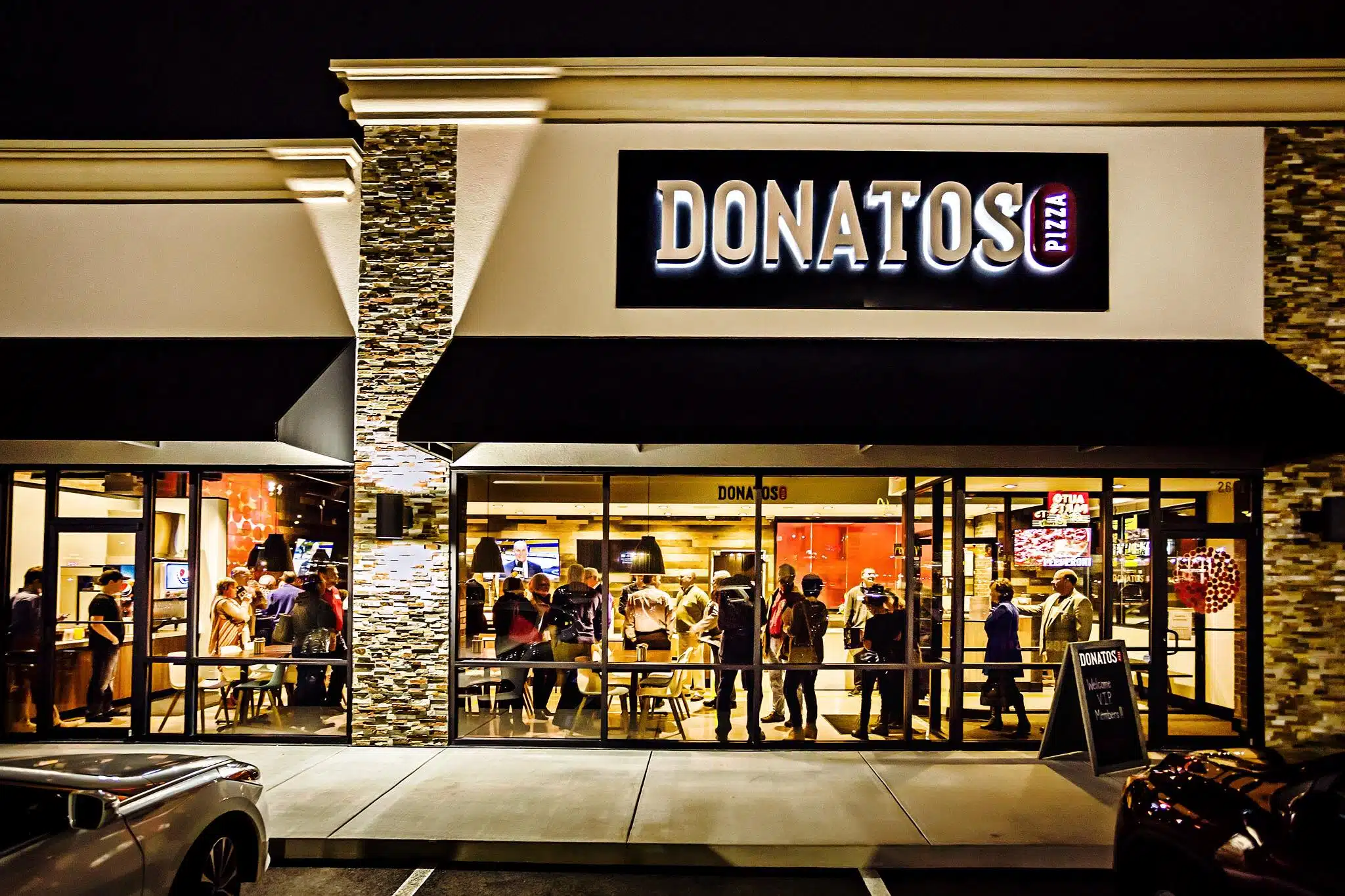
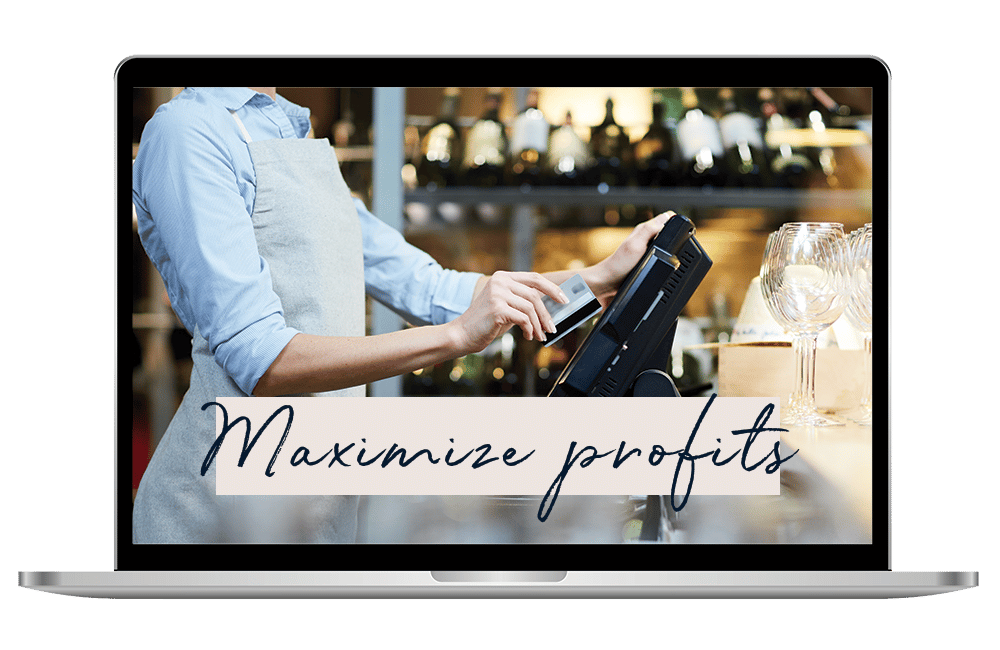
The three costly mistakes you could unknowingly be making?
Find out in this FREE guide and restaurant assessment specifically designed to reveal the unexpected hurdles standing between you and exponential business growth.
Thank You To Our Sponsors
For a limited time only, popmenu is offering our listeners $100 off your first month plus an unchanging lifetime rate.
Request a DEMO:
The key to restaurant communications is cutting edge tech for your customers and team. For more than 35 years, JTECH has been at the forefront of Restaurant Communications.
Restaurant Rockstars listeners get 10% off with our link!
Your operations base camp that scales standard procedures, trains your team, controls operations, and even manages food safety.
Get white glove service with FREE onboarding and implementation.
Want to become a podcast sponsor?
Please get in touch with Roger at roger@restaurantrockstars.com
